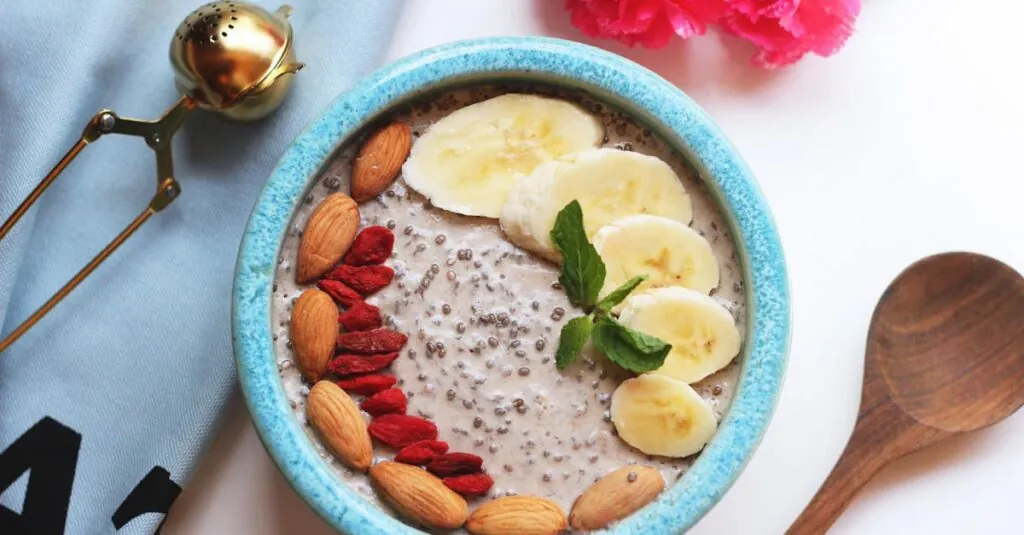Table of Contents
ToggleWhen it comes to feeding babies, parents often find themselves navigating a minefield of choices. Enter organic oatmeal, the superhero of baby food that’s both nutritious and delicious. Packed with fiber and essential nutrients, it’s like a warm hug for tiny tummies. Plus, it’s versatile enough to mix with fruits or veggies, making mealtime a fun adventure instead of a battle.
Benefits of Organic Oatmeal for Babies
Organic oatmeal offers several advantages for infants. Its nutritional profile and health benefits make it a popular choice among parents.
Nutritional Value
Organic oatmeal contains essential nutrients that support a baby’s growth. This food is high in complex carbohydrates, providing energy for active little ones. Iron, an important mineral, is present in oatmeal, contributing to healthy brain development. Additionally, this grain contains vitamins B1 and B5, which aid in metabolic functions. Fiber plays a crucial role, promoting digestive health. Protein found in oatmeal also helps in the overall development of muscles and tissues.
Health Benefits
Introducing organic oatmeal can lead to various health benefits for babies. It promotes healthy digestion due to its fiber content, reducing the risk of constipation. Regular consumption may help stabilize blood sugar levels, resulting in sustained energy without sugar spikes. Organic oatmeal is also gluten-free, making it a suitable option for babies with gluten sensitivities. Its mild flavor allows easy pairing with fruits or vegetables, enhancing the nutritional diversity of a baby’s diet. Furthermore, incorporating this cereal can encourage healthy eating habits from an early age.
Choosing the Right Organic Oatmeal
Selecting the right organic oatmeal for babies involves understanding different types available and familiarizing oneself with trusted brands. Careful consideration of these factors ensures parents make the best choice for their children.
Types of Organic Oatmeal
Instant oats provide convenience, cooking quickly for busy parents. Rolled oats offer a heartier texture and can be blended for smoother options. Steel-cut oats boast a chewy consistency, supplying more fiber and nutrients. Parents often choose among these varieties based on their babies’ preferences and dietary needs. Organic oatmeal options vary, giving families flexibility in meal preparation and customization.
Recommended Brands
Earth’s Best features oatmeal designed for babies with pure organic ingredients and no additives. Happy Baby offers products fortified with probiotics for added digestive support. Gerber provides a variety of organic oatmeal flavors, catering to different taste bud preferences. Parents can also consider Bob’s Red Mill, known for its whole grain options and commitment to quality. Some brands prioritize minimal processing, ensuring wholesome nutrition for infants.
How to Prepare Organic Oatmeal for Babies
Preparing organic oatmeal for babies is straightforward and quick. Parents can choose from various types of oats, allowing flexibility in texture and nutrition.
Cooking Instructions
- Select oats: Choose either instant, rolled, or steel-cut organic oats based on desired texture and preparation time.
- Measure water or milk: Combine one cup of water or unsweetened milk with half a cup of oats for cooking.
- Heat mixture: Bring water or milk to a boil in a saucepan, then stir in oats.
- Simmer gently: Reduce heat and let the mixture simmer. For instant oats, cook for one minute. Rolled oats require about five minutes, and steel-cut oats take around 20 to 30 minutes.
- Cool slightly: Allow oatmeal to cool for a few minutes before serving to ensure the right temperature for babies.
Flavoring Options
Healthy flavoring options enhance the taste of organic oatmeal. Parents can mix in pureed fruits, such as apples or bananas, for natural sweetness.
Adding a pinch of cinnamon boosts flavor without added sugar. For a creamy texture, consider incorporating yogurt or nut butters, if no allergy risk exists.
Experimenting with different combinations keeps mealtimes interesting. Try mixing oatmeal with steamed vegetables like carrots or sweet potatoes for savory options. These additions increase the nutritional value and make oatmeal even more appealing for babies.
Safety and Allergies
When introducing organic oatmeal to babies, safety and allergy considerations remain crucial. Parents must be aware of common allergens present in oatmeal and how to manage them.
Potential Allergens
Oatmeal itself is generally safe for babies, but cross-contamination with gluten-containing grains can pose a risk. Parents should choose certified gluten-free organic oatmeal to eliminate this concern. Some babies might also be sensitive to oats, leading to symptoms like rashes or digestive issues. Monitoring for any adverse reactions after introducing oatmeal helps ensure a safe experience. Always consult a pediatrician when introducing new foods, particularly for babies with known allergies or sensitivities.
Safe Serving Sizes
Serving sizes for organic oatmeal depend on the baby’s age and dietary needs. For infants aged six to eight months, start with one to two tablespoons of cooked oatmeal. Gradually increase to four tablespoons as they grow older and adapt to solid foods. Older infants, around nine to twelve months, can comfortably enjoy half a cup. Always observe portion sizes based on the baby’s hunger cues and developmental stage. Adjusting the consistency of oatmeal to suit the baby’s eating skills promotes safety during mealtime.
Choosing organic oatmeal for babies is a smart decision for parents looking to provide nutritious and wholesome meals. Its versatility allows for endless combinations with fruits and vegetables, making mealtime enjoyable and healthy. With its rich nutrient profile and digestive benefits, organic oatmeal supports a baby’s growth and development effectively.
Parents can confidently explore various types of oats and trusted brands to find the best options that suit their child’s needs. By incorporating organic oatmeal into their baby’s diet, they can instill healthy eating habits early on. Overall, organic oatmeal stands out as a simple yet powerful choice for nurturing little ones.






